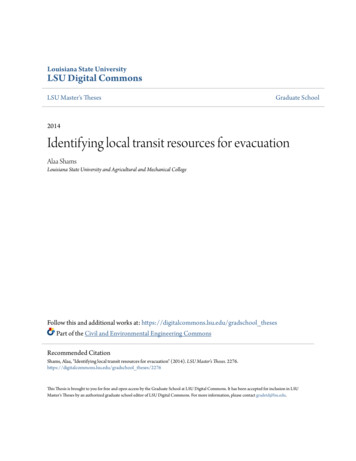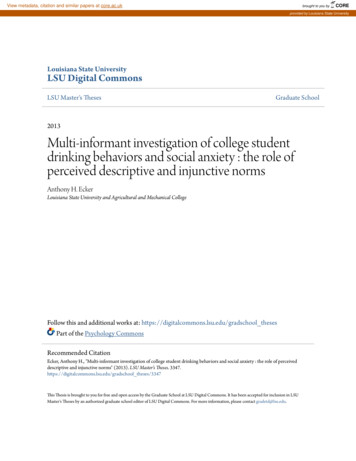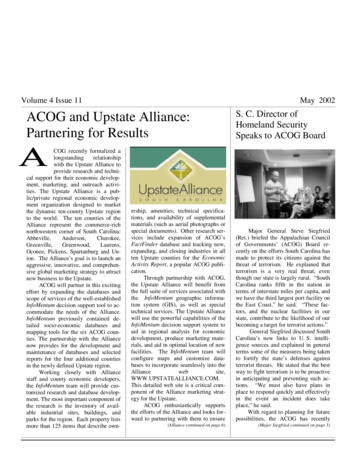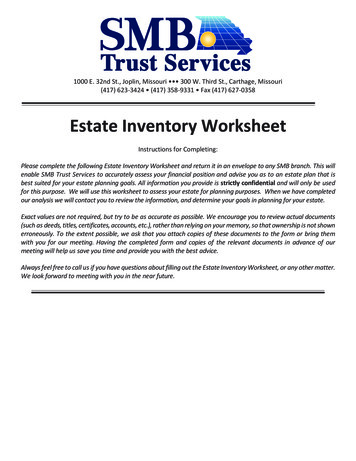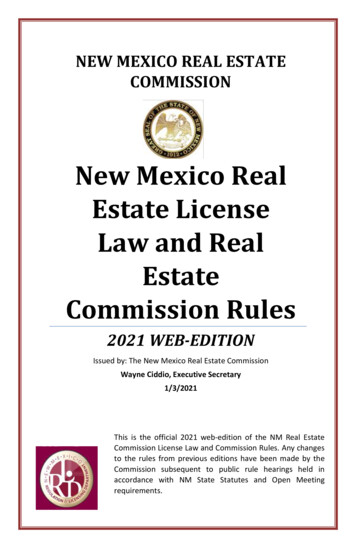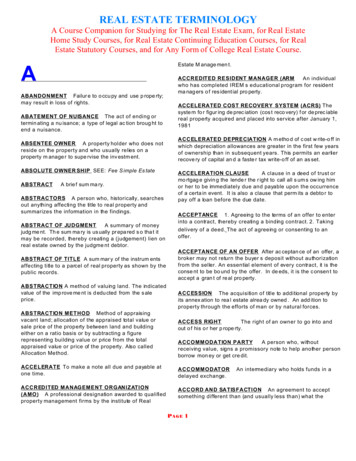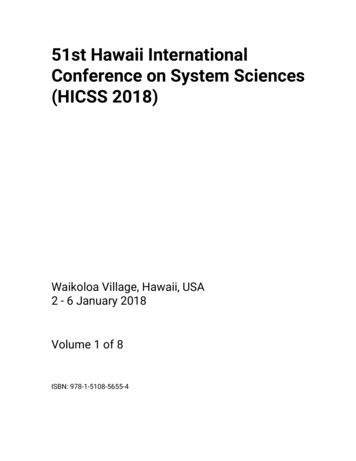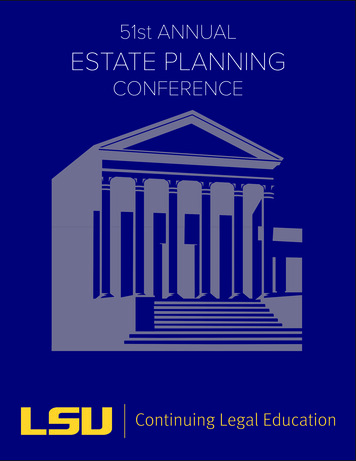
Transcription
51st ANNUALESTATE PLANNINGCONFERENCE
The 51st Annual Estate Planning ConferenceNovember 18, 2021 – November 19, 2021Thursday, November 18, 20217:45 AM - 8:45 AMCheck-in/Registration1.0 hr.8:45 AM - 9:45 AMPost-SECURE Act Estate Planning for Retirement Benefits in Trust (with Forms)Rebecca Luster Radford - Blanchard, Walker, O'Quin & Roberts1.0 hr.9:55 AM - 10:55 AMProfessionalismAngela White-Bazile - Louisiana Judges and Lawyers Assistance Program1.0 hr.11:05 AM - 12:05 PMSettling Difficult SuccessionsTyler Rench - Jones Walker LLPMiriam Henry - Jones Walker LLPAllen Miller - Phelps Dunbar, LLP1.25 hr.1:00 PM - 2:15 PMRecent Developments in Taxation of Interest to Estate PlannersRebecca Hinton - Taylor, Porter, Brooks & Phillips, LLP1.0 hr.2:25 PM - 3:25 PMManaging the Transition of Closely-Held CompaniesKatelyn Gunn - Jones Walker LLP1.0 hr.3:35 PM - 4:35 PMEstate Planning Strategies for Individuals with Moderate Wealth including TaxConsiderationsJacob White - Ayres, Shelton, Williams, Benson & Paine, LLCFriday, November 19, 20218:15 AM - 8:45 AMCheck-in/Registration1.0 hr.8:45 AM - 9:45 AMAncillary SuccessionsJoseph Wilson - Liskow & Lewis1.0 hr.9:55 AM - 10:55 AMEthicsBetty Raglin - Legacy Estate & Elder Law of Louisiana1.25 hr.11:05 AM - 12:20 PMRecent Developments in Successions & DonationsElizabeth Carter - LSU Law Center1.0 hr.1:15 PM - 2:15 PMPractical Drafting Under the Trust Code; 2020 Revision ConsiderationsLeon Rittenberg III - Baldwin Haspel Burke & Mayer, LLC1.0 hr.2:25 PM – 3:25 PMHow Far Reaching is Warne v. Commissioner, T. C. Memo. 2021-17Laura Fine - Lehmann Norman & Marcus LC1.0 hr.3:35 PM – 4:35 PMTestamentary Planning in Louisiana: Tax & Non-Tax ConsiderationsR. Fritz Niswanger - Niswanger Law LLC
SPEAKER BIOGRAPHIESPROFESSOR ELIZABETH R. CARTER is the A.N. Yiannopoulos Professor of Law and the Judge Anthony J.Graphia & Jo Ann Graphia Professor of Law at the Louisiana State University Law Center, where sheteaches and writes in the areas of estates, trusts, taxation, Louisiana civil law, family law, andcommunity property. She is the author of numerous articles and two text books in those areas.Professor Carter also oversees LSU’s Successions/Title Clearing law clinic. In addition to her teachingresponsibilities at the Law Center, Professor Carter teaches the course in federal gift and estate tax inthe University of Alabama’s LL.M. program in taxation. Professor Carter earned a B.S. in Biology and aB.A. in Spanish from the University of Memphis, magna cum laude. She earned her J.D. from TulaneUniversity Law School, magna cum laude. She was elected Order of the Coif, and awarded a Civil LawCertificate. While at Tulane, Professor Carter served as an articles editor of the Tulane Law Review,Volume 81, worked as a research assistant to Professor A.N. Yiannopoulos, and was a founding memberof the Tulane Civil Law Society. Professor Carter was awarded the 2006 Dean Rufus C. Harris Award forthe Best Writing on a Civil Law Subject by the Tulane Law Review. Upon graduation, Professor Carterwas awarded the 2007 Louisiana Bar Association Civil Law Award for attaining the highest grade in civillaw studies. She earned her LL.M. in Tax from the University of Alabama. Before joining the LSU faculty,Professor Carter worked at the New Orleans law firm of Lugenbuhl, Wheaton, Peck, Rankin & Hubbard.LAURA E. FINE is a partner of the law firm of Lehmann Norman & Marcus, LC. Laura received herBachelor’s degree in psychology at Centenary College of Louisiana in her hometown of Shreveport in2001. Laura graduated with her J.D. from Thomas Jefferson School of Law in San Diego, California in2006. She then attended Tulane University Law School and received her LL.M degree in Comparativeand International Law in 2007. She joined Lehmann, Norman, & Marcus in August of 2008. Herconcentration is in the fields of estate planning, estate administration, and business law. She is admittedto practice in California and Louisiana. She is board certificated as a specialist in Estate Planning andAdministration from the Louisiana State Bar Association, a Fellow of the American College of Trust andEstate Counsel, a Chartered Advisor in Philanthropy through the American College, and an AccreditedEstate Planner through the National Association of Estate Planning Councils. She is a Legal Advisoryboard member of Lift Louisiana, a board member of the Human Relations Commission for the City ofNew Orleans, a board member of the New Orleans Planned Giving Council, and a board member of theNew Orleans Estate Planning Council. She was also named a SuperLawyers Rising Star in 2016 and 2017.KATELYN GUNN practices in the area of estate planning, assisting clients with the preparation of wills,trusts, marital property agreements, and powers of attorney. She also works with clients in successionmatters and is involved in the preparation of US estate tax returns. Before joining Jones Walker,Katelyn’s legal experience included advising single‐employer and multi‐employer clients on issuesrelated to qualified pension and welfare plans. Katelyn continues to assist with the preparation of plandocuments, summary plan descriptions, and other documents necessary for plan administration. Whilein law school, Katelyn served as a judicial extern to the Honorable Kurt D. Engelhardt at the US DistrictCourt for the Eastern District of Louisiana. Katelyn also serves on the Board of Directors of HandsOnNew Orleans, a local non‐profit dedicated to promoting and facilitating volunteerism in the Greater NewOrleans community.
MIRIAM WOGAN HENRY is a partner in the Tax Practice Group and a member of the firm’s board ofdirectors. She focuses on estate planning, including family wealth transfer plans, charitable planning,and business succession planning, along with advising clients regarding fiduciary litigation and transfertax controversy matters. Miriam advises on trust and estate planning matters such as drafting wills,trusts, powers of attorney, and marital property agreements. Advising clients in connection with gift andestate tax returns is part of Miriam’s practice, which includes representing clients before the InternalRevenue Service in connection with gift, estate, and generation‐skipping tax audits. She works closelywith members of the firm's Litigation Practice Group in connection with fiduciary litigation and transfertax controversies. Miriam is a fellow of the American College of Trust and Estate Counsel and currentlyserves as the Louisiana State Chair for ACTEC. She has been certified by the Louisiana Board of LegalSpecialization as a Board‐Certified Estate Planning and Administration Specialist. Prior to joining thefirm, she served as a law clerk to Judge Frank J. Polozola of the US District Court for the Middle Districtof Louisiana from 1997 to 1998. Committed to civic engagement and community service, Miriam hasserved on the boards of Trinity Episcopal School and the Louisiana SPCA.REBECCA M. HINTON represents individuals and businesses in the areas of federal, state and localtaxation; tax controversies; estate planning; business matters; successions; and trusts. Rebecca is rankedby her peers among Best Lawyers in tax law. She is an adjunct professor at Louisiana State UniversityPaul M. Hebert Law Center, and frequently presents at CLE and other seminars on the topics of federalestate and gift taxation, estate planning, and federal taxation. Rebecca serves as secretary of the Estate& Business Planning Council of Baton Rouge. In the community, she is a board member of the nonprofitSportsBR, dedicated to uniting sports and the Baton Rouge community.ALLEN C. MILLER is a trial lawyer with extensive experience in the areas of commercial and tortlitigation. He concentrates his practice in the areas of general business torts, casualty litigation,professional malpractice, construction litigation, banking and lender liability, class‐action litigation,bankruptcy litigation, products liability, trade secrets litigation and a variety of other corporate litigationmatters. Allen has extensive experience in complex commercial matters. His professional liabilitypractice involves litigation and trial defense of errors and omissions (E&O), directors and officers (D&O),and professional malpractice claims. Allen’s professional and quasi‐professional subject matters includeinsurance agents and brokers; attorneys; real estate and title agents; accountants/CPAs; architects,engineers and design professionals; and directors and officers. Allen has experience representingowners, contractors, subcontractors and design professionals in all aspects of construction includingclaim drafting and counseling during construction and claims resolution in state and federal courts. Hehas handled construction disputes involving both private and public entities. Allen has representedowners, tenants, contractors and sub‐contractors in state and federal courts in Louisiana, Texas,Alabama and Mississippi. He regularly represents clients in matters involving various aspects of theconstruction process, including delay claims, claims involving construction and design defects, lienclaims, and claims involving performance and payment bonds. Allen has litigated claims involving breachof contract, breach of warranty, construction and/or design defects, negligence, unjust enrichment andconstruction liens. He has handled a substantial number of cases from inception through resolution at
trial, appeal and alternative dispute resolution where appropriate. His experience includes, withoutlimitation, first chair litigation counsel in many successful bench and jury trials in state and federal court.Allen is solely responsible for the litigation strategy and handling of cases for several institutional firmclients and regularly supervises commercial litigation associates and paralegals. He regularly representsnational Fortune 500 companies, privately held companies and educational institutions in federal andstate litigation and disputes throughout the Gulf Coast. In the community, Allen is a graduate of the NewOrleans Regional Leadership Institute, a former Chairman of the St. Augustine High School Board ofDirectors, as well as a member of Benjamin Franklin High School Board of Directors. He is also a memberof the CASA New Orleans Board of Directors and previously served as Board Chair for the City of NewOrleans’ Ethics Review Board.R. FRITZ NISWANGER is the managing attorney of Niswanger Law LLC in West Monroe, Louisiana. Fritzfocuses his practice in the following areas: federal income and transfer tax planning; business entityformations and reorganizations; mergers and acquisitions; trust and estate planning; and assetprotection. He is certified as a tax law specialist by the Louisiana Board of Legal Specialization, holds a JDand an MBA from Tulane University in New Orleans, and holds a BA from Louisiana State University inBaton Rouge.REBECCA S. LUSTER RADFORD is an associate at Blanchard, Walker, O’Quin & Roberts (A ProfessionalLaw Corporation) in Shreveport. Rebecca’s practice primarily involves taxation, estate planning,successions, trusts, and business and commercial transactions. Rebecca is a frequent speaker on estateplanning and taxation topics and is a co‐author of Estate Planning in Louisiana, which is part of theLouisiana Practice Series. She received a Bachelor of Arts in Economics and Business Administration,cum laude, from Rhodes College in 2008 and a Master of Science in Accounting from the University ofVirginia in 2009. Rebecca earned a J.D. and a Graduate Diploma in Comparative Law from LSU's Paul M.Hebert Law Center in 2012, cum laude. Subsequent to her studies at LSU, Rebecca earned a Master ofLaws in Taxation from the University of Florida in 2013.BETTY A. RAGLIN is a Louisiana attorney practicing in the areas of Estate Planning, EstateAdministration, Elder Law, Trusts, Business Planning, Taxation and Civil Litigation. Board Certified by theLouisiana Board of Legal Specialization as a Specialist in the areas of Tax Law and Estate Planning andAdministration, she is a Fellow of the American College of Trust and Estate Counsel, and a co‐author,beginning with 2010‐2011 Supplement, of “Estate Planning in Louisiana” (Thomson West, 1991). Bettygraduated from Louisiana State University’s Paul M. Hebert Law Center and received her Master of Lawsin Taxation from Southern Methodist University. Betty is a frequent presenter at CLE events, a formerChair of the Estate Planning Advisory Committee of the Louisiana Board of Legal Specialization, andformer President of the Southwest Louisiana Bar Association. After relocating to New Orleans this year,she is still in search a Kiwanis Club in the Crescent City. Any suggestions would be welcome!TYLER J. RENCH is a partner in the Litigation Practice Group. He focuses on defending class actions andcivil RICO cases, and also handles oil and gas and banking disputes. Tyler has broad‐based experience
representing clients in federal and state courts, as well as in alternative dispute resolution. Beforejoining Jones Walker, Tyler worked at the US District Court for the Eastern District of Louisiana as anextern to the Honorable Sarah S. Vance. Additionally, he collaborated with Loyola College of Law InterimDean, Kathryn Venturatos Lorio, on updating her Louisiana Civil Law Treatise on Successions andDonations. While in law school, Tyler was an oralist on Loyola's National Moot Court Team. Tyler isactive in the Louisiana legal community and is involved in local non‐profit and civic organizations.LEON RITTENBERG III is a New Orleans native. He attended the Wharton School of Business of theUniversity of Pennsylvania where he studied economics and graduated magna cum laude. He returnedhome to attend Tulane University School of Law where he graduated magna cum laude. Leon was asummer associate at the Internal Revenue Service’s Office of Chief Counsel in Washington, D.C. and alsoserved as a law clerk to the Honorable Will Garwood of the U.S. Fifth Circuit Court of Appeal. Leonjoined the firm in 1994 and became a partner in 2000. His practice focuses on serving the needs of smalland mid‐sized businesses and their owners; including philanthropy and non‐profit law, taxation, finance,private equity, estate planning, probate, real estate, mergers and acquisitions and related matters. Leonrepresents the interests of a number of private investors, oil service businesses, marine transportationcompanies and physician groups. He is a Board Certified Tax Specialist and Board Certified EstatePlanning & Administration Specialist, as certified by the Louisiana Board of Legal Specialization. Hefrequently lectures in areas such as taxation, estate planning and maritime transactions. Leon is a Fellowof the American College of Tax Counsel. He has been recognized by Chambers USA (LouisianaCorporate/M&A: Tax section; 2017), Super Lawyers (Tax, Estate Planning & Probate andBusiness/Corporate) and Best Lawyers in America (Non‐Profit/Charities Law and Trusts & Estates) since2007, and by New Orleans Magazine as one of their “Top Lawyers of New Orleans” for his work inEquipment Finance Law, Mergers & Acquisitions Law and Tax Law. New Orleans City Business selectedhim for their Leadership in Law class of 2014, which “identifies and honors 50 outstanding legalprofessionals whose successes in law and contributions to the community have set the pace for the legalcommunity.” Leon is active in the New Orleans community, serving on the Boards and ExecutiveCommittees of numerous non‐profit organizations. In 2015, he served as chairman of the LouisianaBoard of Legal Specialization’s Tax Law Advisory Committee. He enjoys spending time with his wife andthree children.JACOB CARTER WHITE is a partner at Ayres, Shelton, Williams, Benson & Paine, LLC in Shreveport and isengaged in a transaction‐focused practice covering all facets of Louisiana and Texas business and estateplanning and operations, from initial planning, structuring, and negotiation stages through closing, withan emphasis on federal income (including corporate and partnership), estate, and gift taxation. Inaddition to serving as general outside counsel for various businesses, representative matters includeformation, amendment, governance, and recapitalization of various business entities; representation ofboth purchasers and sellers in taxable stock, membership interest, and asset sales and non‐taxablemergers and reorganizations; tax free property exchanges; and structuring multi‐tiered estate plans,integrating limited liability companies, family limited partnerships, trusts , and private non‐profitfoundations. In addition to his primary transactional practice, Jacob assists clients in Louisianasuccession and ancillary succession proceedings, both complex and simple, and in litigation focusing on
business and estate related matters, including contested succession, fiduciary, and commercialproceedings. Jacob has been listed in Super Lawyers for Louisiana as a Rising Star for his practice in thefield of tax law since 2018. Jacob is a Board Certified Tax Law Specialist by the Louisiana Board of LegalSpecialization and currently serves as a member of the Tax Law Advisory Commission of the LouisianaBoard of Legal Specialization. In 2008, Jacob received his undergraduate degree from Millsaps College inJackson, Mississippi, where he obtained a Bachelor of Arts in History and Spanish, with a Concentrationin American Studies. In 2011, Jacob graduated from the Louisiana State University Paul M. Hebert LawCenter and was admitted to practice in Louisiana in 2011 and in Texas in 2013. Jacob received his LL.M.in Taxation from New York University School of Law in 2014.DR. ANGELA WHITE‐BAZILE is a graduate of University of Southwest Louisiana in Lafayette, Louisiananow known as University Louisiana at Lafayette. She received her juris doctorate from SouthernUniversity Law Center in Baton Rouge in 1996. She also received her Doctorate of Psychology &Counseling. Dr. Bazile has been a practicing attorney for over 20 years. She has held positions such asJudicial Law Clerk/Research Attorney for Civil District Court, the Fourth Circuit Court of Appeals, & theLouisiana Supreme Court; Associate Attorney; and a Professor of the law. She was an In‐house counselfor Prudential Life Insurance in Jacksonville, Florida. She is a proud member of Delta Sigma ThetaSorority, Inc., New Orleans Alumnae Chapter. She is a member of various legal organizations, includingbut not limited to Louisiana State Bar Association, National Bar Association, American Bar Association,Louis Martinet Society, A.P. Tureaud Inns of Court, St. Tammany Parish Bar Association, NationalAssociation of Realtors, etc. Prior to being named the Executive Director of the Louisiana Judges andLawyers Assistance Program, Dr. Bazile was the Executive Counsel to the Louisiana Supreme Court underthe 25th Chief Justice, Chief Justice Bernette Joshua Johnson. She was the Secretary of the LouisianaHuman Trafficking Prevention Commission and the Louisiana Judicial Liaison for human trafficking. She isa recipient of various awards: the 2020 National Bar Association’s Hidden Figure Award; the 2018Southern University Law School’s Distinguished Alumna Award; and the 2017 Louisiana State BarAssociation’s President’s Award. She has been a presenter for various Continuing Legal Educationseminars and is a well‐sought after motivational speaker.JOSEPH T. WILSON is a business and trust and estates lawyer with a practice concentrated in the areasof estate planning and trust and estate administration, as well as real estate, finance and commercialtransactions. Joe assists private clients and corporate fiduciaries with various estate planning andprobate needs, including the drafting and administration of wills and trusts, and development andimplementation of tax minimization plans. Joe further advises real estate clients, such as real estateholders, managers and developers, and manufacturing and industrial facilities owners and operators, inmatters relating to the acquisition, development, leasing and sale of commercial real estate, including allassociated title matters. Joe earned his undergraduate degree from the University of Dallas and J.D.from Louisiana State University’s Paul M. Hebert Law Center.
We are a leading, independent,fiduciary wealth management firm.Gary MooreDavid ThibodeauxJim ChristmanJill Knight NaltyAnn Marie MillsTimothy D. QuinnMarket PresidentLouisianaVP & Trust OfficerBaton RougeBusiness Dev. OfficerNew OrleansSenior Vice PresidentRustonVP & Trust OfficerLake CharlesSenior Vice PresidentShreveportFor over 30 years, Argent has provided individuals and families witha broad range of wealth management services, including trustadministration, estate planning, investment management and oil andgas (mineral) management, as well as a variety of services for businessesand institutions. Today, Argent is responsible for more than 35 billionof our clients’ assets.4224 BLUEBONNET BLVD, SUITE ABATON ROUGE, LA 708091400 MARKET STREET, SUITE 1ALAKE CHARLES, LOUISIANA 70601500 EAST REYNOLDS DRIVERUSTON, LA 71270(800) 269-0076ArgentTrust.comQ E DC201 ST. CHARLES AVE., SUITE 2420NEW ORLEANS, LA 70170333 TEXAS STREET, SUITE 699SHREVEPORT, LA 71101
POST-SECURE ACTPost-SECURE Act Estate Planning for Retirement Benefitsin Trust (with Forms)The 51st Annual Estate Planning ConferenceNovember 18, 2021By: Rebecca S. Luster RadfordBlanchard, Walker, O’Quin & Roberts, a Professional Law CorporationRegions Tower, Suite 700333 Texas StreetShreveport, Louisiana 71101
POST-SECURE ACTTABLE OF CONTENTSI. Relevant Changes Under the SECURE Act for Inherited IRAs and Impact on ExistingLaw .1a. Eligible Designated Beneficiary vs. Designated Beneficiary vs. Not a DesignatedBeneficiary .1II. Is a trust appropriate under your circumstances? .8III. What type of trust is appropriate for your client? .10IV. See-through trust requirements .12IV. Conduit trust .21V. Accumulation Trust.23VI. Items to consider for drafting .40VII. Forms for provisions in the trust .46ii
By: Rebecca S. Luster RadfordI.Relevant Changes Under the SECURE Act for Inherited IRAs and Impact onExisting Lawa. Eligible Designated Beneficiary vs. Designated Beneficiary vs. Not aDesignated Beneficiaryi. The Setting Every Community Up for Retirement Enhancement Actof 2019 (“SECURE Act”) as incorporated in the FurtherConsolidated Appropriations Act, 2020 fundamentally changed theway inherited IRAs must be distributed after the death of theparticipant.ii. Subsequent to the SECURE Act, for account holders that die afterDecember 31, 2019, the recipient of the IRA1 must be categorizedinto the following:1. Not a designated beneficiary2. Designated Beneficiary (“DB”)3. Eligible Designated Beneficiary (“EDB”)iii. In some cases, it must be determined whether the participant diedbefore his required beginning date (“RBD”) for required minimumdistributions (“RMD”).1. Generally, a participant (other than a “5% owner” [SeeI.R.C. § 416]) in a qualified plan must begin to receiveRMDs by the later of April 1 of the calendar year following:a. Either:i. the year in which the participant reaches age70 ½ (if such participant attains the age of 70½ in or before 2019); orii. the year in which the participant reaches age72 (if such participant attains the age of 70 ½in 2020 or later) or,b. The year in which the participant retires.iv. If the beneficiary is not a Designated Beneficiary1. The SECURE Act did not change the rules for those who donot qualify as a DB.The rules regarding IRAs also apply to other 401(k) plans, 403(b) plans & to some extent Roth IRA plans& some qualified defined contribution plans.1POST-SECURE ACTPost-SECURE Act Estate Planning for Retirement Benefits in Trust (with Forms)
POST-SECURE ACT2. Look to whether or not the participant died before his RBDa. If the participant died before his RBD, then the 5year rule of I.R.C. § 401(a)(9)(B)(ii) is applied byrequiring the distribution of the participant’s“entire by the end of the calendar year whichcontains the fifth anniversary of the date of the[participant]'s death.”2 (“5-Year Rule”)b. If the participant died on or after his RBD, then thebenefits are distributed over the remaining lifeexpectancy of the deceased participant.3v. If the beneficiary is a Designated Beneficiary but not an EligibleDesignated Beneficiary1. I.R.C. § 401(a)(9)(E)(i): “The term “designated beneficiary”means any individual designated as a beneficiary by theemployee.”2. All EDBs are DBs but not all DBs are EDBs.3. There is no need to determine whether the participant diedbefore his RBD if the beneficiary is a DB but not an EDB.4. The 5-Year Rule was modified to create a 10-Year Rulepursuant to I.R.C. § 401(a)(9)(H)(i) for DBs that are notEDBs.5. The distributions of the entirety of the interest of such DBmust be made within ten years after the account holder'sdeath (“10-Year Rule”).46. We have limited guidance on this new 10-Year Rule (and onthe impact of the SECURE Act generally); the IRS publishedPublication 590-B Distributions from Individual RetirementArrangements (IRAs) on May 31, 2021, which provides apreview of what the regulations may ultimately include butis not law.5 Publication 590-B clarified that:Treas. Reg. § 1.401(a)(9)-3 A-2.Treas. Reg. § 1.401(a)(9)-5 A-5(a)(2) & (c)(3).4I.R.C. § 401(a)(9)(H)(i).5Natalie B. Choate, Estate Planning for Retirement Benefits in a Post-SECURE World, August 23, 2021, p.6.232
7. “For a beneficiary receiving life expectancy payments whois either an eligible designated beneficiary or a minor child,the 10-year rule also applies to the remaining amounts in theIRA upon the death of the eligible designated beneficiary orupon the minor child beneficiary reaching the age ofmajority, but in either of those cases, the 10-year period endson the 10th anniversary of the beneficiary's death or thechild's attainment of majority.”68. The imposition of the 10-Year Rule has drastically reducedthe attractiveness of holding retirement benefits in trust forDBs who are not EDBs, and particularly in conduit trustswhich would require complete payout within 10 years forthose DBs who are not EDBs.vi. Eligible Designated Beneficiaries1. There are 5 categories of EDBs under pursuant to I.R.C. §401(a)(9)(E), with such determination occurring as of thedate of the account holder’s death:a. The surviving spouse of the participant (“SurvivngSpouse” or “SS”);b. A child of the account holder who has not reachedthe age of majority (“Non-Major Child”);c. a disabled beneficiary within the meaning of I.R.C. §72(m)(7) (“Disabled Individual”);d. a “chronically ill individual (within the meaning of[I.R.C. §] 7702B(c)(2), except that the requirementsof subparagraph (A)(i) thereof shall only be treatedas met if there is a certification that, as of such date,the period of inability described in suchsubparagraph with respect to the individual is anindefinite one which is reasonably expected to belengthy in nature)”7 (“Chronically Ill Individual”)I.R.S. Publication 590-B, Distributions from Individual Retirement Arrangements (IRAs) (May 31, 2021),p. 11.7I.R.C. § 401(a)(9)(E)(ii)(IV).63POST-SECURE ACT“The 10-year rule requires the IRA beneficiaries whoare not taking life expectancy payments to withdrawthe entire balance of the IRA by December 31 of theyear containing the 10th anniversary of the owner’sdeath. For example, if the owner died in 2020, thebeneficiary would have to fully distribute the plan byDecember 31, 2030. The beneficiary is allowed, butnot required, to take distributions prior to that date.”
POST-SECURE ACT(EDBs under c and d are collectively referred to as“Disabled or Chronically Ill” or “D/CI” herein),ande. an individual who is not more than 10 years youngerthan the participant (“NoMoTTY”).2. Pursuant to I.R.C. § 401(a)(9)(E)(ii), “the determination ofwhether a designated beneficiary is an eligible designatedbeneficiary shall be made as of the date of death of theemployee.”3. Surviving Spouse of the participant as the named DBa. The SS’s options for the Applicable DistributionPeriod:i. Spousal Rollover or Election to Treat IRA asOwn: The Surviving Spouse may roll thebenefits into their own IRA or (if an inheritedIRA), elect to treat the inherited IRA as his orher own. This rule is unaffected by theSECURE Act.8ii. If the Surviving Spouse does not rollover thebenefits or elect to treat the IRA as his or herown, then compare whether the participantreached his or her RBD:(1) If the participant died before hisRBD, then Surviving Spouse canchoose between:A. The special Surviving Spouseversion of the life expectancypayout; orB. 10-Year Rule; or(2) If the participant died on or after hisRBD, then the Surviving Spouse canchoose between:A. The special Surviving Spouseversion of the life expectancypayout; orNatalie B. Choate, Estate Planning for Retirement Benefits in a Post-SECURE World, August 23, 2021, p.54; See I.R.S. Publication 590-B, Distributions from Individual Retirement Arrangements (IRAs) (May 31,2021), (
The 51st Annual Estate Planning Conference November 18, 2021 - November 19, 2021 Thursday, November 18, 2021 7:45 AM - 8:45 AM Check-in/Registration 1.0 hr. 8:45 AM - 9:45 AM Post-SECURE Act Estate Planning for Retirement Benefits in Trust (with Forms) Rebecca Luster Radford - Blanchard, Walker, O'Quin & Roberts

